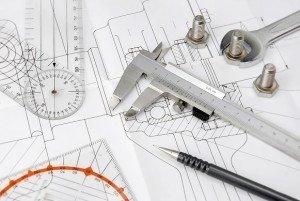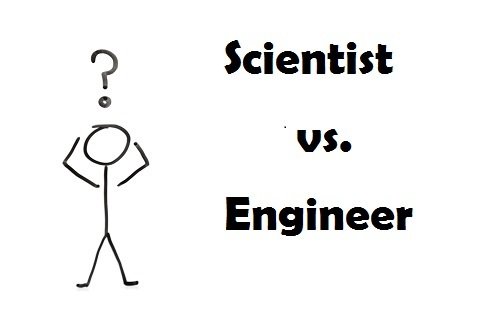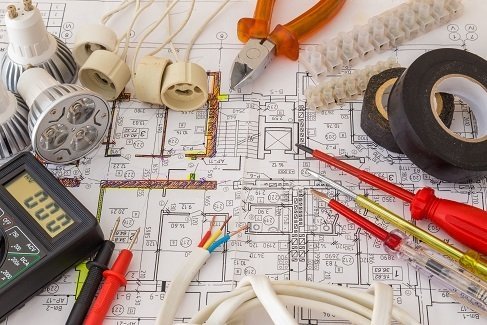Science and engineering represent two different initials in STEM, but are they really all that different? Read on to get the lowdown on scientist versus engineer jobs!
First, let’s go to the dictionary. The definition for science is:
 “The intellectual and practical activity encompassing the systematic study of the structure and behavior of the physical and natural world through observation and experiment.”
“The intellectual and practical activity encompassing the systematic study of the structure and behavior of the physical and natural world through observation and experiment.”
And the definition for engineering:
“The branch of science and technology concerned with the design, building, and use of engines, machines, and structures.”
So when we think of a scientist versus engineer, the two aren’t separate entities but belong to each other – without science, there wouldn’t be engineering.
What do engineers do?
Engineering is a multifaceted field and there are a variety of branches, but the four main concentrations are mechanical, chemical, electrical, and civil. Each of these fields relies on science.
 Simply put, mechanical deals with anything that moves and uses physics; chemical obviously goes hand-in-hand with chemistry; electrical deals with math and computer science; and civil also relies on physics as it focuses on the design, construction, and maintenance of the physical environment, including roads, bridges, canals, dams, and buildings.
Simply put, mechanical deals with anything that moves and uses physics; chemical obviously goes hand-in-hand with chemistry; electrical deals with math and computer science; and civil also relies on physics as it focuses on the design, construction, and maintenance of the physical environment, including roads, bridges, canals, dams, and buildings.
Engineering boils down to how things work. If you enjoy using math and science to do problem-solving, you should consider studying engineering.
Scientist versus Engineer
Though engineering is a science, there are several things that set it apart as a field.
1. Scientists observe the world, while engineers focus on creating. While both fields do involve observation and analysis, engineering mainly deals with creating and working on already existing creations, while scientists work with things in nature.
 2. Engineering is a much more specific field. Even though engineering deals with a variety of issues and topics, it’s narrowed down to the study of how things work. Science has a much broader range of study.
2. Engineering is a much more specific field. Even though engineering deals with a variety of issues and topics, it’s narrowed down to the study of how things work. Science has a much broader range of study.
3. Science creates questions, while engineering creates solutions. Though this is not a hard rule, science, in general, deals with observing and coming up with hypotheses and theories, while engineering helps to create solutions to answer those questions. So the two truly do complement each other.
So is the “vs.” really necessary? Yes and no. Science and engineering are two different fields, but they go hand-in-hand and are under the same family of study. So if you like engineering, you’re probably a fan of science too!
While both science and engineering are traditionally male-dominated fields, some awesome women have made major contributions to both. Check out these famous female scientists and famous female engineers.







[…] was inspired this week in an article from STEM Jobs. For students, they probably think that they are doing the exact things and […]
I am not a student but a retired radiation oncologist woman M.D. (I used to study and to use radiophysics in my job) I think I can share some of the information from your web page on my Facebook page. I would like to continue encouraging young generations, especially young women to study STEM careers because I love math and science.
Recently there was a discussion (with some nasty remarks from some engineers) on FB page because I thought that mechanical engineers are scientists too (I have a son that is a mechanical engineer, who took nuclear submarine classes at the university and works for the Navy). I believed that the fact that you studied and use math, physics, etc. and many of you do research confirmed my beliefs (I apologize if I am wrong). I google scientists vs, mechanical engineers and in some web pages they put the two group together or overlap them and in others, they separated them into two groups.
I’m an engineer with a master’s degree in environmental engineering. Some engineers tend to be arrogant, usually because they are good at math, while many other people are not. This is of course childish. They demean themselves and their chosen field when they behave this way. Engineers spend a great deal of time studying the sciences, and many of us do indeed conduct original scientific research in our fields, especially if pursuing an advanced degree. Engineers use science to solve practical or real-world problems, just as you did while practicing medicine. All engineers and medical doctors are scientists, but not all scientists are engineers or doctors. Leonardo Da Vinci was an engineer. Leonardo Da Vinci was a scientist. Leonardo Da Vinci was also an artist – and all of this was long before this silly debate began.
I agree with Eva. Engineering students and students of chemistry or physics or biology degrees etc study the same thing. They take the same classes. Even the senior level classes are using the same formulas and studying the same phenomena. Many engineers spend all of their career doing research which is science. And most who get the science degrees end up in Industries where they are in a creative or manufacturing role which is engineering. Engineers are scientists if they are involved in research and scientists are Engineers if they are creating. It has to do with what you’re doing not your title.
What is frustrating is the urge people have to call anyone an engineer, as well as the pretense that scientists have a more difficult degree than 4 yr degreed engineers and deserve greater respect. All that is false. An HVAC engineer has at most a 2 year tech degree. A “Systems Engineer” often has a 2 yr tech degree. 4 yr degrees have 2x more schooling from which they should be able to do far more, and their degree is as hard as any scientist degree. Not all degrees are equally difficult either. Chem E is far more difficult than environmental engineering for example.